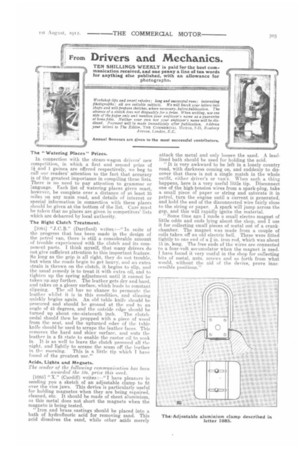From Drivers and Mechanics.
Page 21

If you've noticed an error in this article please click here to report it so we can fix it.
TEN SHILLINGS WEEKLY is paid for the best communication received, and one penny a line of ten words for anything else published, with an allowance for photographs.
The "Watering Places" Prizes.
In connection with the steam-wagon drivers' new competition, in which a first and second prize of and 1 guinea are offered respectively, we beg to call our readers' attention to the fact that accuracy is of the greatest importance in compiling these lists. There is no need to pay attention to grammar or language. Each list of watering places given must, however, be complete over a distance of at least 35 miles on any main road, and details of interest or special information in connection with these places should be given at the bottom of the list. Care must be taken that no places are given in competitors' lists which are debarred by local authority.
The Right Clutch Treatment.
[1084] "J.C.B." (Dartford) writes :—" In spite of the progress that has been made in the design of the petrol van, there is still a considerable amount , of trouble experienced with the clutch and its component parts. I think myself, that many drivers do not give sufficient attention to this important feature. So long as the grip is all right, they do not trouble, but when the roads begin to get heavy, and an extra strain is thrown on the clutch, it begins to slip, and the usual remedy is to treat it with extra oil, and to tighten up the spring adjustment until it cannot be taken up any further. The leather gets dry and hard, and takes on a glossy surface, which leads to constant slipping. The oil has no chance to permeate the leather whilst it is in this condition, and slipping quickly begins again. An old table knife should be procured and should be ground at the end to an angle of 45 degrees, and the outside edge should he turned up about one-sixteenth inch. The clutchpedal should then be propped with a piece of wood from the seat, and the upturned edge of the table knife should be used to scrape the leather faces. This removes the hard and shiny surface, and nuts the leather in a fit state to enable the castor oil to soak in. It is as well to leave the clutch prnoned all the night, and lightly to scrape the scum off the leather in th, morning. This is a little tip which T have found of the greatest use."
Acids, Lights and Magnets.
The sender of the following communication, has been awarded the Ms. prize this week..
[1085] "X." (Cardiff) writes :—" I have pleasure in sending you a sketch of an adjustable clamp to fit over the vice jaws. This device is particularly useful for holding magnetos when they are being repaired, cleaned, etc. It should be made of sheet aluminium, as this metal does not short the magnets when the magneto is being tested. "Iron and brass castings should be placed into a bath of hydrofluoric acid for removing sand. This acid dissolves the sand, while other acids merely attack the metal and only loosen the sand. A leadlined bath should be used for holding the acid.
" It is very awkward to be left in a lonely country road, with darkness coming on, and suddenly to discover that there is not a single match in the whole outfit, either driver's or van's. When such a thing happens, here is a very useful little tip. Disconnect one of the high-tension wires from a spark-plug, take a small piece of paper or string and saturate it in petrol, turn the engine until a current is generated, and hold the end of the disconnected wire fairly close to the string or paper. A spark will jump across the gap, and this will rapidly ignite the material. "Some time ago I made a small electro magnet of little odds and ends lying about the shop, and I use it for collecting small pieces of metal out of a crankchamber. The magnet was made from a couple of coils taken off an old electric bell. These were fitted tightly to one end of a in. iron rod, which was about 15 in. long. The free ends of the wires are connected to a four-volt accumulator when the magnet is used. I have found it very useful in the shop for collecting hits of metal, nuts, screws and so forth from what would, without the aid of the. device, prove inaccessible positions."






















